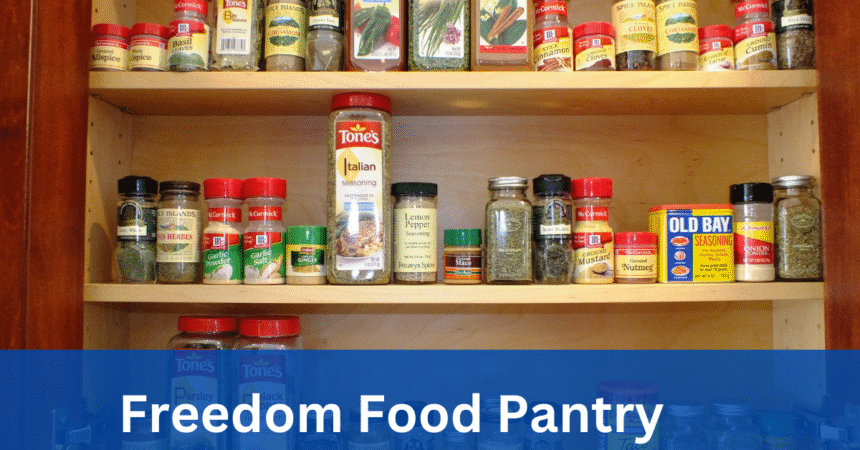In numerous households, it is hard to put food on the table everyday. Unexpected bills, increased costs, and emergencies may imply that it is hard to cover basic needs. Here is where the Freedom Food Pantry comes in. The grocery store is more than a grocery shopping spot that aims at offering dignified, hope and relief to those in need during hard times. Whatever the reason is, whether you are in a situation that needs help, someone that wants to contribute to the neighborhood or just interested in how this business of food pantry works, this guide would detail everything you need to know about Freedom Food Pantry and its efforts.
What is Freedom Food Pantry?
The Freedom Food Pantry is a community engagement program which consists of receiving donations of food, sorting it and then distributing it among people and families who require such assistance. It is usually operated via churches or community centers or nonprofit organizations. Although precise spaces can differ by city, the goal does not- the mission is to combat hunger with dignity. Rather than seeing it as charity, the pantry, as many families termed it, was life saving. It gives some time to others till the next pay. It is a stable source of support to others in longer-term situations of difficulty.
A Story That Shows the Impact
Maria, a single mother with two kids, remembers her first time in the pantry when she lost her job. She was scared and did not know what to anticipate. She thought she would be met with scornful looks, rude volunteers, and scarcity of supplies, and instead was met with friendly volunteers, healthy food and even some baby food and items.
I felt embarrassed after the meeting, but I felt cared about when I went. They did not only provide me with food. They restored my sense of hope to me.” Stories such as Maria are why Freedom Food Pantry exists. It is not only calories and groceries. It is concerned with honoring dignity and reminding families that they are not alone.
How Does Freedom Food Pantry Work?
The pantry runs on a simple yet powerful system:
- Donations – Local individuals, grocery stores, farmers, and businesses donate food items and funds.
- Volunteers – Community members sort food, stock shelves, and welcome guests.
- Distribution – Families come during open hours, usually weekly or biweekly, and take home what they need.
Some pantries also provide household items, toiletries, or holiday meal boxes to meet seasonal needs.
Tips for First-Time Visitors
If you plan to visit a Freedom Food Pantry for support, here are some tips that can make your experience smoother:
- Bring ID or proof of residence – Some pantries ask for documentation to confirm you live in the area.
- Arrive early – Supplies can run out quickly, especially during weekends or holidays.
- Bring reusable bags or boxes – They make carrying food home much easier.
- Ask about limits – Many pantries have rules about how often you can visit, such as once a week.
- Check schedules online or by phone – Hours may vary, and some require appointments.
Challenges Food Pantries Face
While Freedom Food Pantry brings hope to many, it also faces challenges:
- High demand – Economic downturns and inflation increase the number of families needing support.
- Seasonal pressure – Holidays, back-to-school seasons, and winter months put extra strain on supplies.
- Donation gaps – Pantries rely heavily on community generosity. When donations slow down, shelves can become empty.
- Storage issues – Keeping perishable items like fruits, vegetables, and dairy fresh can be difficult without enough refrigeration.
These challenges make volunteer work and donations more important than ever.
How to Donate to Freedom Food Pantry
Every contribution, no matter how small, makes a difference. You can help in the following ways:
- Food Donations: Non-perishable items like rice, pasta, canned vegetables, peanut butter, baby formula, and cereals are always welcome.
- Fresh Produce: Some pantries accept fruits and vegetables from home gardens or local farms.
- Monetary Support: Cash donations help pantries buy bulk food, fill gaps, and cover operational costs.
- Household Items: Soap, toiletries, and cleaning supplies are often overlooked but much needed.
Tip: Before donating, check expiration dates. Freshness matters, and expired food often cannot be distributed.
Volunteering at Freedom Food Pantry
If you want to make a direct impact, volunteering is a meaningful way to do so. Typical volunteer tasks include:
- Stocking shelves and organizing donations
- Helping guests select food
- Packing boxes for deliveries to homebound families
- Managing registration or paperwork
- Assisting with special holiday drives
Beyond the work itself, many volunteers say the experience strengthens their sense of belonging and gives them perspective on the struggles others face.
Why Freedom Food Pantry Matters
Hunger is not always visible. A neighbor, coworker, or classmate could be skipping meals to make sure their children eat. The Freedom Food Pantry reduces this hidden struggle and builds stronger, more compassionate communities.
By supporting the pantry, whether through donations, volunteering, or simply spreading awareness, you are helping create a safety net that everyone might need at some point in life.
FAQs about Freedom Food Pantry
What kind of food is usually available?
Most pantries provide canned goods, rice, pasta, cereal, beans, bread, and sometimes fresh produce, dairy, or frozen meat.
Do I have to live in a certain area to use the pantry?
Some locations only serve residents of specific neighborhoods. Always check the guidelines of your local pantry.
Can I donate money instead of food?
Yes. Monetary donations are often more useful since pantries can buy food in bulk at discounted prices.
Is there a limit to how often I can visit?
Many pantries allow weekly or biweekly visits, but rules vary.
How do I find my nearest Freedom Food Pantry?
You can search online, check community bulletin boards, or call local churches and nonprofits to ask about pantry locations.
Can children and teens volunteer?
In most cases yes, but some pantries have age requirements for safety. It is best to call ahead before bringing young volunteers.
Conclusion
The Freedom Food Pantry is more than a distribution center. It is a place where compassion meets action, where neighbors help neighbors, and where dignity is preserved in the face of hardship.
Whether you are seeking help, donating food, or volunteering your time, your involvement makes a meaningful difference. Together, we can ensure no family in the community goes to bed hungry.





